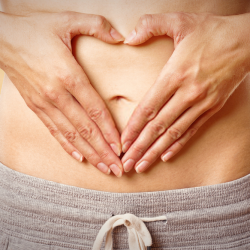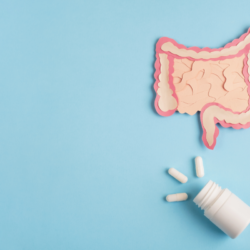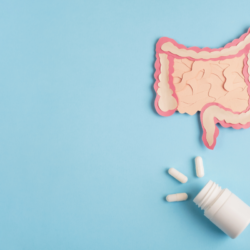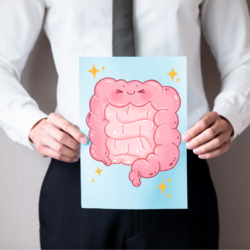What is Irritable Bowel Syndrome?
Also called irritable bowel syndrome or spastic colon, this syndrome is characterized by recurrent abdominal discomfort or pain accompanied by relief from defecation, associated with a change in stool frequency or stool consistency.
Intestinal permeability:
People with irritable bowel syndrome (IBS) have increased intestinal permeability. Hypermeability means that the cells that make up the intestinal barrier can no longer effectively retain certain types of food particles.
When these enter the intestinal tissue and the bloodstream, they are responsible for triggering the symptoms of IBS, either by immune response or by simple irritation and inflammation of the tissues.
However, probiotic supplementation can normalize gut permeability in many of these people. After four weeks of treatment with a probiotic formula containing the strains Streptococcus thermophilus, Lactobacillus bulgaricus, L. acidophilus and Bifidobacterium longum, the percentage of people with IBS with gut permeability may decrease from 28% to 64%.
Altered intestinal microbiota:
In addition to deterioration of the intestinal barrier, people with IBS have an impairment of the gut microbiota. This “dysbiosis” refers to an imbalance between the dominant bacterial and / or yeast species inhabiting the intestine. This can be defined as a qualitative alteration, however other disturbances of the intestinal flora may be quantitative, involving the disproportionate proliferation of bacteria normally present in smaller quantities. This describes the special case of what can happen with bacterial overgrowth of the small intestine (SIBO).
While it is normal and healthy for the large intestine to harbor billions of bacteria, the small intestine under healthy conditions contains significantly less. In the case of SIBO, the number of bacteria in the small intestine increases dramatically, resulting in symptoms of IBS such as bloating, pain and bowel disturbances. Probiotic supplementation is indeed an important strategy to restore and maintain a healthy intestinal flora.
What Are the Causes of Irritable Bowel Syndrome?
Emotional, dietary, drug, or hormonal factors can actually promote or worsen gastrointestinal symptoms. However, irritable bowel syndrome usually results from a combination of psychosocial and physiological factors.
These factors include:
- Impaired intestinal motility
- Increased intestinal sensitivity (visceral hyperalgesia)
- Various genetic and environmental factors
However, there is an exacerbation of the pain perception in the presence of intestinal gas in normal quantity; this may be the result of a remodeling of the neural pathways of the brain-gut axis. One in 7 people feel that their symptoms started especially after an episode of acute gastroenteritis (called post-infectious irritable bowel syndrome).
Some people have anxiety disorders (especially panic attacks, depression or somatization). Sleep disturbances are also present. However, times of stress and emotional conflict do not always coincide with the onset or recurrence of symptoms. Some affected people seem to express their emotional conflicts in the form of gastrointestinal symptoms, usually abdominal pain. It is therefore essential to look for unresolved psychological conflicts. Psychosocial factors also affect the course of irritable bowel syndrome.
What is the mode of action of irritable bowel syndrome?
Constipation can be explained by slow colonic transit and diarrhea by rapid colonic transit. Some people with constipation have fewer, wide-spread intestinal contractions, which propel colonic contents to multiple segments of the colon. Conversely, an excess of motor activity of the sigmoid can delay the transit in the event of functional constipation.
Postprandial abdominal discomfort can be attributed to an exaggerated gastrocolic reflex (the colon’s motor response to a meal), the presence of large-amplitude spreading contractions, visceral hyperalgesia, or a combination of these factors. Ingestion of fat can also increase intestinal permeability and exaggerate hypersensitivity. Ingestion of foods rich in fermentable oligosaccharides, disaccharides, monosaccharides, and polyols (collectively referred to as FODMAPs) poorly absorbed in the small intestine can increase colon motility and secretions.
Some naturopathic advice to limit the symptoms:
- Self-massage of the stomach:
A self-massage of the belly stimulates the motor skills of the colon and helps the progression of these painful gases, but also the progression of stools.
- Osteopathy to relieve digestive discomfort:
Osteopathy can relieve functional colopathy. The visceral massages it offers relieve functional intestinal disorders and it improves biliary disorders.
- Sophrology to tame pain:
This relaxation technique allows those who practice it regularly to gradually control the pain associated with this chronic pathology.
Food side:
- Chew food well to facilitate digestion
- Drink 1 to 1.5 liters of water every day for good hydration
- Favor a normal diet, avoiding foods that produce gas (peas, dry beans, broccoli, cabbage, onions, bran) or causing diarrhea
- Cut down on caffeinated drinks, sodas, and alcohol
- Reduce the consumption of foods rich in FODMAPs: reduction (without suppression) of lactose (sugar present in milk, yogurts), fructose (sugar contained in honey, apples, pears, dates, oranges)
In general, a normal diet is possible. Meals should not be too large, eaten regularly and in peace. The subject suffering from abdominal distension and gas may benefit from reducing or even avoiding beans, cabbage and other foods rich in fermentable carbohydrates. Reduce the intake of sweeteners (sorbitol, mannitol, fructose); constituents of natural or processed foods (apple or grape juice, bananas, nuts, grapes) can also reduce gas, bloating and diarrhea.
Dietary fiber supplements can soften the stool and make it easier to pass. Ballasting agents can be used (wheat bran, starting with 1 tablespoon with each meal, associated with increased fluid intake). As an alternative, hydrophilic psyllium mucilage with two glasses of water can be used. However, excessive use of fiber can lead to meteorism and diarrhea, fiber doses should be individualized. Dietary fibers should be consumed in normal amounts, but well distributed over the day.
As for medicinal plants:
Tonic and anti-inflammatory digestive and colon, it acts on the problems of the gastric sphere due to stress. Useful in irritable bowel syndrome, digestive spasm, digestive spasmophilia, bloating, aerogastria and slow digestions.
These seeds have effective use in occasional constipation and irritable bowel syndrome. Laxative and detoxifying, they dissolve toxins present in the intestine.
This EPS is used in digestive spasms, gastrointestinal disorders and irritable bowel syndrome.
Mint is indicated for colopathies, spasmodic colitis, digestive spasms and irritable bowel syndrome. It has a relaxing and antispasmodic effect on intestinal smooth muscles. To do this, it acts by blocking the calcium channel as well as by a probably parasympatholytic effect.





